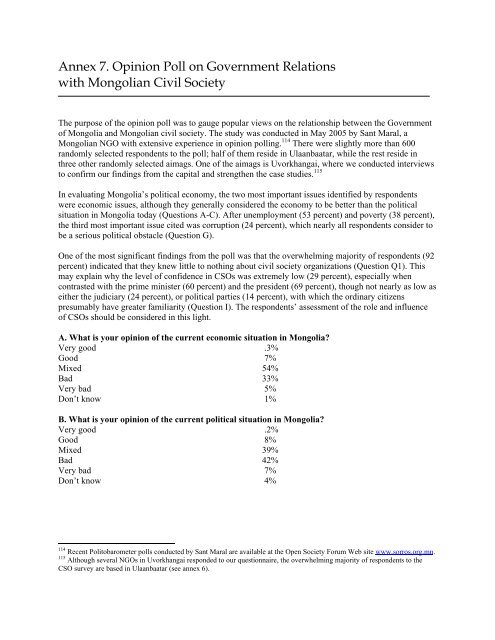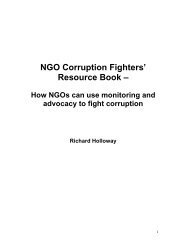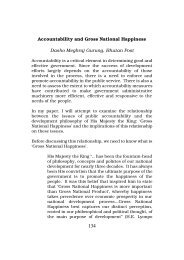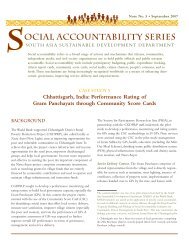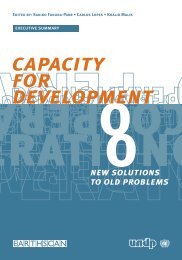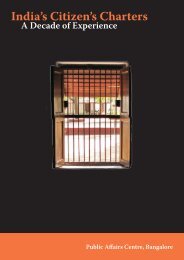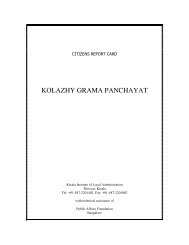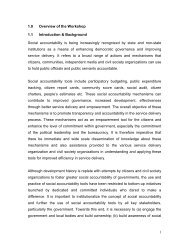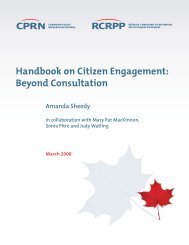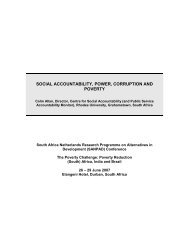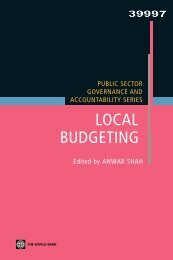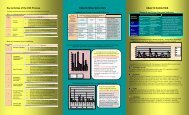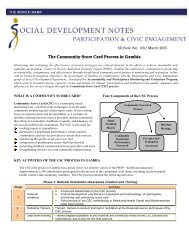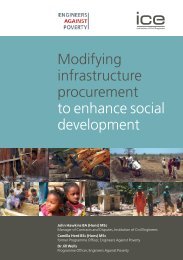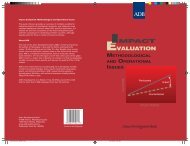Enabling Environment for Social Accountability in ... - SASANet
Enabling Environment for Social Accountability in ... - SASANet
Enabling Environment for Social Accountability in ... - SASANet
Create successful ePaper yourself
Turn your PDF publications into a flip-book with our unique Google optimized e-Paper software.
Annex 7. Op<strong>in</strong>ion Poll on Government Relations<br />
with Mongolian Civil Society<br />
The purpose of the op<strong>in</strong>ion poll was to gauge popular views on the relationship between the Government<br />
of Mongolia and Mongolian civil society. The study was conducted <strong>in</strong> May 2005 by Sant Maral, a<br />
Mongolian NGO with extensive experience <strong>in</strong> op<strong>in</strong>ion poll<strong>in</strong>g. 114 There were slightly more than 600<br />
randomly selected respondents to the poll; half of them reside <strong>in</strong> Ulaanbaatar, while the rest reside <strong>in</strong><br />
three other randomly selected aimags. One of the aimags is Uvorkhangai, where we conducted <strong>in</strong>terviews<br />
to confirm our f<strong>in</strong>d<strong>in</strong>gs from the capital and strengthen the case studies. 115<br />
In evaluat<strong>in</strong>g Mongolia’s political economy, the two most important issues identified by respondents<br />
were economic issues, although they generally considered the economy to be better than the political<br />
situation <strong>in</strong> Mongolia today (Questions A-C). After unemployment (53 percent) and poverty (38 percent),<br />
the third most important issue cited was corruption (24 percent), which nearly all respondents consider to<br />
be a serious political obstacle (Question G).<br />
One of the most significant f<strong>in</strong>d<strong>in</strong>gs from the poll was that the overwhelm<strong>in</strong>g majority of respondents (92<br />
percent) <strong>in</strong>dicated that they knew little to noth<strong>in</strong>g about civil society organizations (Question Q1). This<br />
may expla<strong>in</strong> why the level of confidence <strong>in</strong> CSOs was extremely low (29 percent), especially when<br />
contrasted with the prime m<strong>in</strong>ister (60 percent) and the president (69 percent), though not nearly as low as<br />
either the judiciary (24 percent), or political parties (14 percent), with which the ord<strong>in</strong>ary citizens<br />
presumably have greater familiarity (Question I). The respondents’ assessment of the role and <strong>in</strong>fluence<br />
of CSOs should be considered <strong>in</strong> this light.<br />
A. What is your op<strong>in</strong>ion of the current economic situation <strong>in</strong> Mongolia?<br />
Very good .3%<br />
Good 7%<br />
Mixed 54%<br />
Bad 33%<br />
Very bad 5%<br />
Don’t know 1%<br />
B. What is your op<strong>in</strong>ion of the current political situation <strong>in</strong> Mongolia?<br />
Very good .2%<br />
Good 8%<br />
Mixed 39%<br />
Bad 42%<br />
Very bad 7%<br />
Don’t know 4%<br />
114 Recent Politobarometer polls conducted by Sant Maral are available at the Open Society Forum Web site www.sorros.org.mn.<br />
115 Although several NGOs <strong>in</strong> Uvorkhangai responded to our questionnaire, the overwhelm<strong>in</strong>g majority of respondents to the<br />
CSO survey are based <strong>in</strong> Ulaanbaatar (see annex 6).


